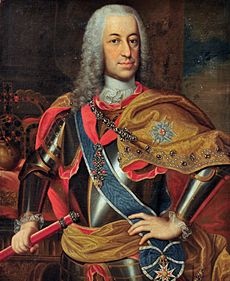Lucius Vetus
Lucius Vetus | |
|---|---|
 Portrait of Vetus in his armor. | |
| Born | March 7, 1672 Alexandria, Empire of Exponent |
| Died | June 12, 1745 (aged 73) Redemption, Empire of Exponent |
| Rank | Legate |
| Battles/wars | Aquitaynian War of Independence |
Lucius Vetus was a Legate in the Empire of Exponent, most famous for the capture of Jamestown during the Aswickan War of Independence.
Early years
Lucius Vetus was born to a wealthy and influential family of merchants and tribunes in 1672. Attending the prestigious military academy of Albastrata near Paradisa, he enrolled in the Imperial Army under command of the Centurion – soon to be legate – Caius Tullius Caetile, becoming his protégée.
Social prestige and military career
In times of relative peace, Lucius Vetus followed the cursus honorum: he became tribune, following the footsteps of his father, then aedile and then again censor, securing the grace of the Imperial Palace and the nobility, as he was appointed Centurion at the age of 40 based entirely on his prestige and loyalty.
Following Legate Caius Tullius Caetile in Scottopia to sedate a revolt, in 1719, he was promoted to Legate himself despite his scarce military achievements.
Role in the Aquitaynian war of independence
In 1729 he was dispatched in Aquitaynia as Imperial Lieutenant, tasked with assisting in the administration of the imperial territories and peacekeeping the area, as rumors of unrest started to spread.
His administrative efforts, used to the rigor of the capital, were rendered ineffective by the lax command structure of the new territories and the careless attitude of his superiors; feeling the unrest growing, he decided to promote bans on gatherings and unions, as well as enforcing death sentence and expropriation towards all those rumored of being revolutionaries.
Unfortunately, his actions were all but detrimental to the imperial cause, increasing the animosity of the people and contributing to the process that would lead to the war of independence; it’s in this period that he earned the nickname “Enemy of the people”.
As the war broke out in April 1735, he was directly in command of the garrison in New Atlieum; as his countermeasures proved ineffective in avoiding a revolt and the militia started fighting against the imperial army, he laid siege to the city suffering heavy losses at the hand of General Alexander Jones, only to retreat seeking reinforcements.
Right afterwards, on July 16th 1735, he led the Imperial efforts against the Aswickan capital of Jamestown, outnumbering the rebels and inflicting a devastating blow on their morale as their capital swiftly fell and their main army body was pursued.
In the pursuit, though, Lucius Vetus made a tactical mistake by assigning the frontline to the Imperial Guard, that fell in an ambush set up by the retreating force and was decimated.
Giving up on the pursuit, he consolidated his position in Jamestown while the rebel leadership consolidated near the river Tyde.
End of the military career and legacy
Upon reading the recounts of the military campaign, the Emperor called Lucius Vetus back to Paradisa, where he retreated to private life.
He died eight years later in infamy, on June 12th 1745, but his family name would be restored by one of the most brilliant – yet short lived – Imperial politicians: his son, Marcellus Vetus.